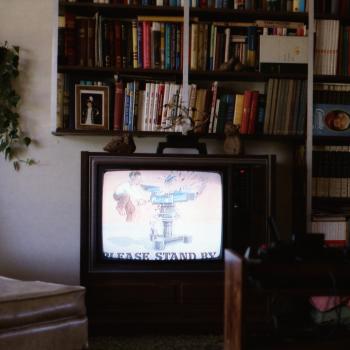 “You do not have a soul. You are a soul. You have a body.”
“You do not have a soul. You are a soul. You have a body.”
–C.S. Lewis
To be an artist is to be constantly dissatisfied. Many acclaimed artists have said this, and though not acclaimed, I identify. I have habit of sitting on projects for too long, afraid to let go until they’re absolutely perfect, a habit that usually doesn’t lead to perfection but preciousness, an inability to let go.
In an attempt to be more at ease with doing as Faulkner commanded and “kill my darlings,” I’m doing a similar thing when I read, looking out for the precious progeny of the author.
David Foster Wallace, whose many detractors feel he should have killed a few hundred more darlings in his loose, baggy fiction, speaks to this double vision in his 1988 essay “Fictional Futures and the Conspicuously Young,” collected for the first time in his posthumous book of essays Both Flesh and Not.
Wallace writes, “Today’s journeyman fiction writer finds himself both a lover of serious narrative and an ineluctably conditioned part of a pop-dominated culture in which the social stock of his own entertainment is falling. What we are inside of—what comprises us—is killing what we love.”
I don’t recommend reading Wallace when trying to work on being a more merciless killer-of-your-darlings because he is not interested in economy. He’s not worried about a reader being turned-off by his rapacious erudition; he’s interested in making himself as clear as possible—that’s what’s up with the footnotes, he admitted in an infamously awkward interview with Charlie Rose.
I’ve started to change my tune, or at least not worry so much, because, as Wallace’s essay argues, what we should be worrying about is that our stylistic choices are being informed by what sells, by what is “watchable.”
Then, and even more so now, audiences expect to be entertained. Neil Postman, whose seminal book Amusing Ourselves to Death was published three years before Wallace’s essay, describes entertainment as one of the sacred rights afforded Americans.
And if being entertained is a right, then books, film, and music that do not deliver the goods clearly and directly will be seen, ultimately, as not just a waste of time but as offensive. After all, as Dr. King once said, “A right delayed is a right denied.”
Like Postman, Wallace sees this situation in a quasi-moral and ethical light. He argues that popular entertainment is affecting “the existential predicaments” of audiences because “we are strongly encouraged to identify with characters for whom death is not a significant creative possibility…we lose any sense of eschatology, thus of teleology, and live in a moment that is, paradoxically, both emptied of intrinsic meaning or end and quite literally eternal.”
Wallace’s dropping of the “e-word” (eschatology) raises the stakes of the conversation to a mystical level that many of his contemporaries (Mark Leyner, Jonathan Franzen, and Richard Powers, to name a few) wouldn’t/won’t go. We are finite beings, and Wallace contends:
The danger is that, as entertainment’s denials of the truth get even more effective and pervasive and seductive, we will eventually forget what they’re denials of. This is scary. Because it seems transparent to me that, if we forget how to die, we’re going to forget how to live.
Wallace might come off as a little too hard on television here—I mean, he’s asking a lot of it. But consider that what began as a way of transmitting visual information across long distances, quickly became the source of entertainment and information in the home—a medium that has become the cultural common ground for the vast majority of Americans. Television doesn’t just keep us informed as to what is going on in the culture, it is culture.
Wallace wrote this essay in the mid-1980s at a moment when the literary world was clamoring for writing by the “conspicuously young,” writers like Jay McInerney and Bret Easton Ellis, whose fiction was, according to their detractors, as shallow and materialistic as the culture that informed it—a vision of the world that was transfused through the glass teat of television.
According to Wallace, television’s pablum of melodrama and crass mercantilism nourished a stylistic revolution among young writers, an “ultra-minimalism” characterized by a “deliberately flat, understated, ‘undersold’” tone, a kind of drug-induced catatonia that allows the writer to describe events at the “emotional remove of light-years.”
Though sympathetic, Wallace sees the ultra-minimalistic catatonic style as a pose, a facile belief that “simply by inverting the values imposed on us by television and commercial film, advertising, etc., they can automatically achieve the aesthetic depth popular entertainment so conspicuously lacks.”
Any depth achieved is more trompe l’oeil than anything else, which, Wallace writes, makes us “at once more self-conscious and less reflective”—more aware of the surfaces of things but less critical of our lusty satisfaction with them. Or, to put it another way, more fleshly and less modest.
This is where eschatological thinking is supremely important: it acts as a stay against the idea that, as Wallace writes, “the most significant feature of persons is watchableness” a quality usually indicated by a person’s physical beauty or grotesqueness—sometimes both.
In addition, the “eternal” episodic quality of television can the be reclaimed and subverted in such a way that the audience is empowered to think beyond the nihilistic horizon of the show or film by seeing it against the much larger world of experience beyond the soundstage—transcendence.
If I were sticking to my original project of trying to weed out the darlings, I would return here to Wallace’s smackdown of ultra-minimalism and how it opened my eyes to my own stylistic choices.
But I’ve realized that his style is not the headline: it’s his ability as an essayist to make us forget about him as the autodidactic dude, the literary persona–and to focus us on David Foster Wallace the intellect, the soul.










